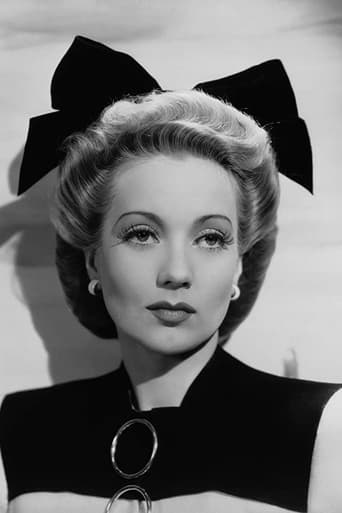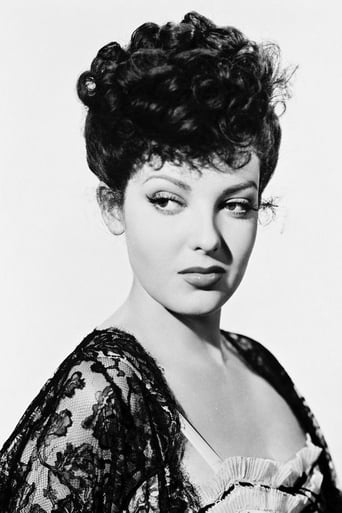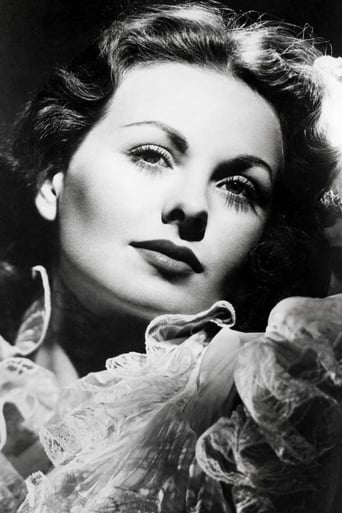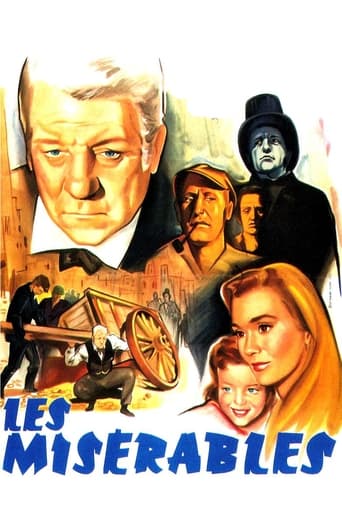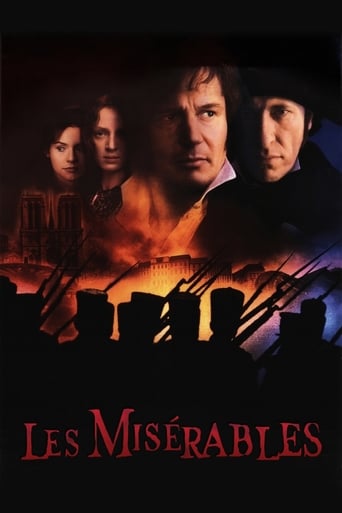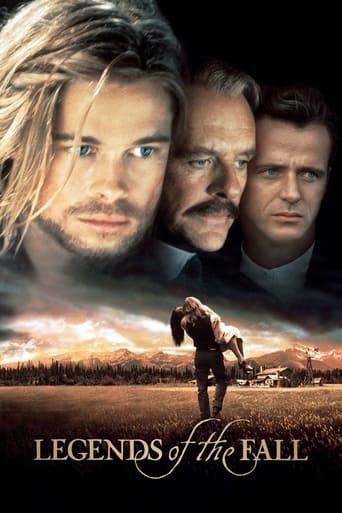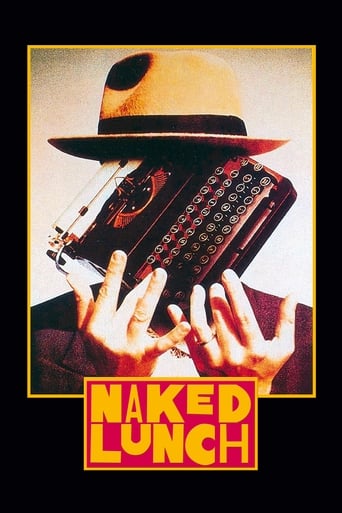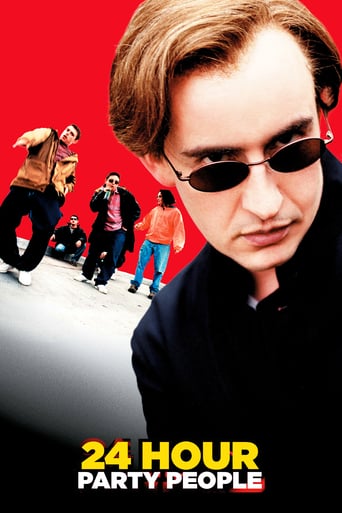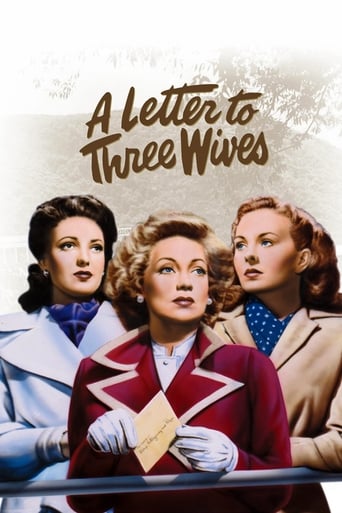
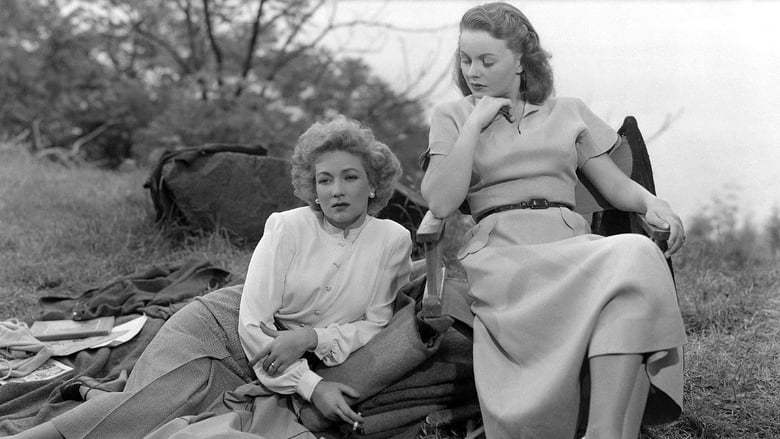
A Letter to Three Wives (1949)
A letter is addressed to three wives from their "best friend" Addie Ross, announcing that she is running away with one of their husbands - but she does not say which one.
Watch Trailer
Cast
Similar titles
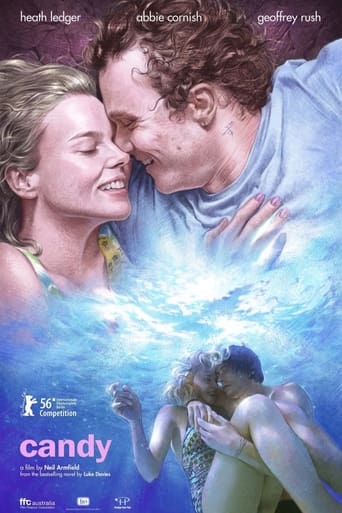

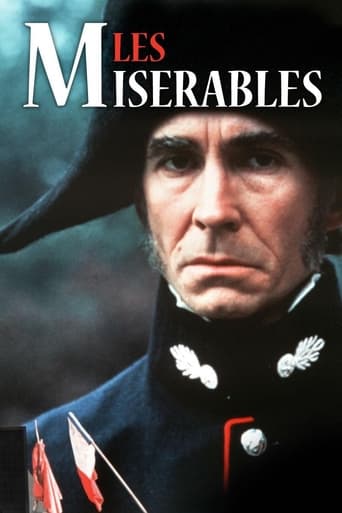

Reviews
It's fun, it's light, [but] it has a hard time when its tries to get heavy.
The performances transcend the film's tropes, grounding it in characters that feel more complete than this subgenre often produces.
I really wanted to like this movie. I feel terribly cynical trashing it, and that's why I'm giving it a middling 5. Actually, I'm giving it a 5 because there were some superb performances.
This is a coming of age storyline that you've seen in one form or another for decades. It takes a truly unique voice to make yet another one worth watching.
Noir makes for not only powerful drama, but it can also be associated with satiric comedy. A very good example of this association is Joseph L. Mankiewicz's A Letter to Three Wives (1949), particularly in the Paul Douglas and Linda Darnell finale sequence. Kirk Douglas also plays a noir character, although his episode is much less guilt-charged and is lightened considerably by the not-coming-down-too-hard playing of Ann Sothern as the ambitious-for-Kirk wife. And Kirk does have an obvious, not-so-hard way out of his dilemma, whereas Paul Douglas and Linda Darnell are trapped in a situation not easily resolved. In fact, Paul has a job and a half as he endeavors to make the resolution convincing. That he succeeds so brilliantly is a measure of a really fine actor! (The Fox DVD rates 10/10 in my book).
Where to begin. I'd really rather not give away too much of the story-lines in this one because it's so enjoyable experiencing each in its own right. It's safe to read this and the next paragraph if that's what you decide for yourself. Joseph L. Mankiewicz not only won the Best Director Oscar for this film, but the Best Writing, Screenplay statuette as well. The picture itself was also nominated, losing to All the King's Men (1949). Mankiewicz would win these same two Oscars the following year with the Academy Award winning Best Picture All About Eve (1950); it features an outstanding cast, just like this one.After a brief introduction to two of the wives (Jeanne Crain and Ann Sothern), during which we learn all is not perfect in suburbia (e.g. their marriages), the third (Linda Darnell) joins them at the beach where they're about to embark on a ferry to an island for their community's day-long 18th Annual picnic together. However, just as they're about to board, a messenger arrives with a letter addressed to the three of them from an unattached "high class" socialite, whom had been expected to join them and, whom also has a history with each of their husbands. After debating whether to open it or not, they decide to do so. The letter is then voice-over read to "us" by Celeste Holm, whose voice appears uncredited as the aforementioned woman, Addie Ross. In essence, it says that she has just run off with one of their husbands! They then gaze longingly at the telephone booth on the docks as their ferry boats departs for the island, with them aboard (I guess this story wouldn't work as well in the age of cell-phones).We then learn about the wives' relationships with their husbands, each other and Ms. Ross, in a series of three flashbacks, one for each couple but which also includes the others as well (except for Ms. Ross whom, though we never see her, is involved or offstage in each of them). Crain was a small town girl who met and married the town's "high class" man (Jeffrey Lynn), whom she met while they served together in the Navy (during the war?). He'd always been expected to come home and marry Ms. Ross. This is the shortest of the three segments, and it basically consists of Crain being so scared of meeting her husband's established clan of country club friends, that she gets drunk and embarrasses herself during the event.The second flashback further introduces us to Sothern and her husband (Kirk Douglas). She brings home the bacon as a writer for a radio program, the newest rage, while he's a highly educated school teacher (interesting role for Douglas, eh?). They have twin children, who are never seen such that we don't know if they're boys or girls, and a hired cook (played deliciously, as always, by the marvelous Thelma Ritter, uncredited). She's prepared the home cooked meal for a big invite evening with Sothern's boss, appropriately named Mrs. Manleigh (Florence Bates), who runs roughshod over her husband (played by another great character actor, Hobart Cavanaugh). Darnell and her husband (Paul Douglas) are also dinner guests. There are a series of unfortunate events which lead to a row between the couple after their guests have left. The dialogue in this segment is particularly sharp and poignant. Carl 'Alfalfa' Switzer also appears briefly, and uncredited, as a messenger boy.The third segment details how the "other side of the tracks" Darnell hooked her "working class" successful business owner husband by playing "hard to get". Douglas's character had been previously married, and originally just wanted to "fool around" with his employee Darnell. This is probably the least interesting of the segments, you've seen it all before or since, but it does involve some noteworthy performances by Ms. Ritter (again), Connie Gilchrist as Darnell's Irish mother, and Barbara Lawrence as her baby sister.The influence of Ms. Ross "over" the husbands is felt by the wives in all three segments, though more strongly in some versus others. However, Mankiewicz's direction is much too clever to reveal the identity of the wayward husband ... and it would spoil it if I revealed any more!
With a "friend" like Addie Ross who needs enemies? Deborah, Rita and Lora Mae are the three wives of the film's title. And Addie Ross is going to deliver them that devastating letter. The trio of young wives are good friends, Addie very much the outsider whom they keep a wary eye on. And wary they should be because each of their husbands is quite clearly smitten with Addie. The men look upon Addie as a goddess. The women look upon her with disdain. Addie knows how they feel about her. And boy will she ever get her revenge. The trio of wives are about to embark on a daylong cruise, chaperoning a group of underprivileged children. And just before the boat sets off Addie has that letter delivered to them. She tells them she is leaving town for good...and she has taken one of their husbands with her. And Addie really twists the knife by not saying which husband it is she has run off with. So now our three wives face a long day of torment, each wondering if she will be the one to return home to find her husband gone. That Addie Ross, what a stinker.As the cruise goes on we, through a series of flashbacks, see how each wife's marriage is somewhat strained, why each husband may be tempted to run away. First up is Deborah, a simple farm girl who met her husband-to-be Brad in the Navy. Deborah is desperately uncomfortable in Brad's upper class social circle. And also very uncomfortable with the fact that everyone in that circle always assumed Brad was going to marry Addie. Next comes the telling of Rita's story. She's a successful career woman, writing scripts for popular radio programs. Her husband George, a humble teacher, is a little insecure about the fact his wife is more successful than he is. It all comes to a head at an exceedingly awkward dinner Rita hosts for her boss. That the dinner happens to be on George's birthday, a fact Rita forgot until a present arrives from Addie, doesn't help matters. Finally we come to Lora Mae. She's married to Porter, perhaps the richest man in town. Did he ever want her for anything more than her beauty? Did she ever want him for anything more than his money? Is there any love here at all? And why, the first time Porter brings Lora Mae to his home, did he have a picture of Addie on top of his piano? So the women all wonder who's lost her husband and we wonder right along with them. The story is very engaging, wonderfully scripted with plenty of good wit sprinkled throughout. Addie narrates the story but director Joseph L. Mankiewicz uses a smart device to keep her largely shrouded in mystery. The less we know about this supposed goddess the more intriguing things become. Addie sets the plot in motion but it is the three wives whom she torments who carry the film. And each of the three actresses plays her part wonderfully. Jeanne Crain plays the bundle of insecurities that is Deborah. This is clearly the most sympathetic character. You know if her husband leaves she'll fall to pieces and Crain really makes you feel for the poor woman. The other two women are much more assured. But Rita comes to realize maybe she was a little too assured for her own good. Has she emasculated, and ultimately lost, her husband? Ann Sothern plays this part and her interactions with Kirk Douglas, playing her husband, are top-notch. And then there is Linda Darnell, playing Lora Mae. Easy to see why Porter would want Lora Mae, Darnell's a stunner. But Darnell has more than her good looks going for her, she's a very strong actress too and she gives it as good as she gets with Paul Douglas, playing Porter. The rest of the film is very good but Lora Mae's story is a cut above, helped greatly by the powerful performances of Darnell and Paul Douglas. If Lora Mae was just in this marriage for money her husband running off would actually be a good thing. But maybe there's love there after all. Darnell captures that ambiguity perfectly.It's the women's picture, they're the unquestioned stars. But both Kirk Douglas and Paul Douglas have very important parts to play in the film's success as well. Jeffrey Lynn, playing Deborah's husband, has much less to do but what he does do he does capably. There's also a fun appearance from Thelma Ritter providing some comic relief in the role of a house servant. And of course, hovering over the whole picture, is the looming specter of Addie Ross. Mankiewicz uses her in just the right way to add another layer to the film's mystery. The film presents a smart, engrossing story. The three wives weave in and out of each other's stories, everything ties together beautifully. The relationships the wives have with their respective husbands are most important but the relationships they have with each other are very telling too. By the time that boat finally docks and the women race home to hopefully find their husbands you're right on the edge of your seat. Few romantic films are as dramatic as this. This is a very well thought-out, well-crafted, and ultimately very satisfying film.
Three wives and friends (Jeanne Craine, Ann Southern, Linda Darnell) get a letter from a woman they know. She said she is leaving town...and taking one of their husbands (Jeffrey Lynn, Kirk Douglas, Paul Douglas) with her. The women have no access to a phone so they all think back to why their husbands might be the one leaving.This starts off as a sharp cynical look at marriage and love and ends up being soapy and sentimental...but it still works. The script (a deserved Oscar-winner) is sharp. It's full of great one-liners and perceptive views of love and marriage. The cast is great and put over all their lines perfectly. Joseph Mankiewicz also won an Oscar as Best Director which he deserved. There are some very clever camera movements or techniques that clearly tell you what the characters are thinking without calling attention to itself. So, phony ending aside, this is a smart, beautifully written, acted and directed movie. Worth catching.
